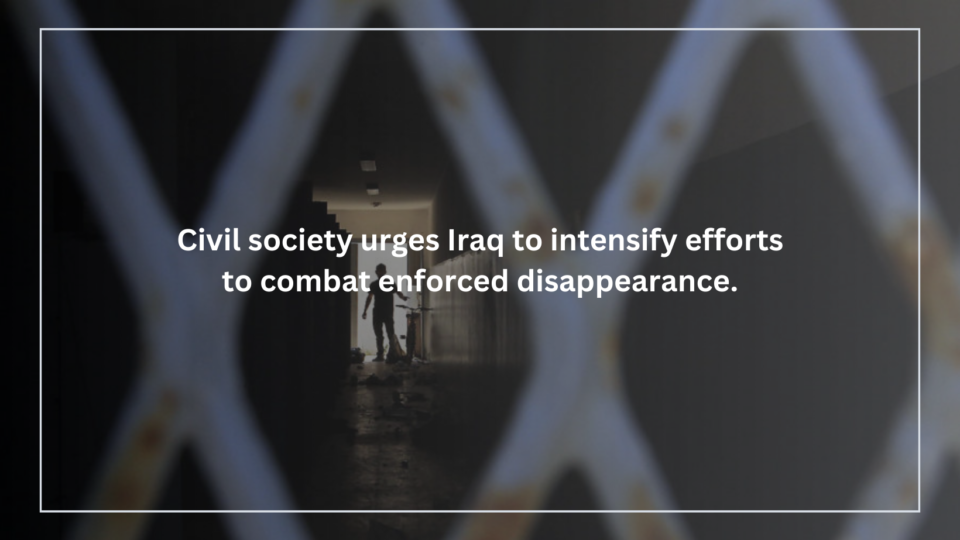Civil society urges Iraq to intensify efforts to combat enforced disappearance.
6th of April 2023
A group of Iraqi and international non-governmental organizations urged the Iraqi government in a joint statement to take urgent measures to address the widespread phenomenon of enforced disappearances in the country, in accordance with the priorities outlined by the United Nations Committee on Enforced Disappearances during its visit on April 5, 2023.
With an estimated number of between 250,000 to one million missing and disappeared individuals in the country – the largest number in the world – the national action plan to combat this phenomenon must be a strategic priority. In the absence of structural changes, the signatories fear the continued spread of the “culture of impunity” highlighted by the committee, which exposes more Iraqi citizens to enforced disappearance in the future and perpetuates unresolved grievances that threaten fragile peace in the country.
The undersigned organizations state, “We are pleased to see that the recommendations of the United Nations Committee on Enforced Disappearances align with the recommendations of many organizations working to combat enforced disappearance.” “We call on the international community to support these efforts.”
Background of the visit.
On November 23, 2010, Iraq became the 20th state to ratify the International Convention for the Protection of All Persons from Enforced Disappearance. However, more than a decade later, authorities have not succeeded in ending this practice.
In an attempt to address this issue, the United Nations Committee on Enforced Disappearances requested a visit to Iraq in November 2015. In a positive step, the Iraqi government accepted the request after six years, and in November 2022, three members of the committee visited the country.
In Baghdad, Anbar, Erbil, Mosul, and Sinjar, members of the United Nations Committee on Enforced Disappearances met with families of victims of enforced disappearance, government officials, and delegations from the Iraqi High Commission for Human Rights and civil society organizations.
Deep-rooted practice
Enforced disappearance has been identified as a “massive problem.” The committee in its report pointed out that this practice has persisted for decades. With the rise of the Ba’ath regime to power in the late 1960s, thousands of Iraqis were abducted due to their political, ethnic, and religious affiliations, whether real or perceived. In the aftermath of the U.S. led invasion of Iraq in 2003, thousands of Iraqis disappeared after being taken by the multinational forces, Iraqi authorities, or various active militias during the sectarian violence that followed the overthrow of the Ba’ath regime.
Cases of enforced disappearance remained widespread between 2014 and 2017, following the seizure of vast territories by the so-called Islamic State in Iraq and Syria (ISIS), which specifically targeted ethnic and religious minorities. Government forces and various armed groups that assisted in liberating Iraqi territories from ISIS also hid civilians during the conflict and its aftermath.
The recent wave of enforced disappearances occurred in the context of youth-led protests in support of reform, particularly in Baghdad and southern Iraq, which erupted in October 2019 onwards. The United Nations committee on enforced disappearances has pointed to the excessive use of force by security forces, including the use of live ammunition to disperse protesters, resulting in deaths and injuries. Their report also highlighted arbitrary abduction and detention of protesters, many of whom were later forcibly disappeared.
Combating Impunity
Iraq has not yet incorporated enforced disappearance as a separate crime in its domestic law. Despite the existence of 30 legislations addressing this issue, none of them provides a clear definition of enforced disappearance, which often leads to confusion with concepts such as “detention,” “missing person,” and “abduction.”
The committee found that “the legislative silence on enforced disappearance is associated with the absence of specific procedures to search for missing persons and conduct corresponding investigations,” and added that “this leads to confusion between concepts and thus prevents clear identification of the scope of the crime and state responsibility.”
As long as enforced disappearance is not recognized as a separate crime, it cannot be addressed or prosecuted. To address this gap, the committee urged the Iraqi government to “establish a unified legal framework to address all cases of enforced disappearance.”
UN experts expressed concern about Article 130 of the Code of Criminal Procedure, which allows the investigating judge to temporarily close an enforced disappearance case if the perpetrator is unknown. They also described the current administration of “security investigations” as “another factor contributing to impunity.” Such investigations remain necessary for filing complaints, requesting searches for disappeared persons, or accessing broader rights for family members classified as “martyrs.” If the disappeared person is listed in any of the authorities’ “wanted lists” the family and relatives lose all rights and cannot access any form of truth and justice.
Furthermore, in order to obtain financial compensation for the loss of their loved ones, family members must assume their death and obtain a death certificate, causing indescribable pain and denying their right to know the truth.
Thus, the committee called on the authorities to “put an end to practices that hinder access to justice and perpetuate enforced disappearance, including through amending legislation that guarantees victims their rights to reliable security investigation results.”
Search for the Missing
The committee expressed regret that the Iraqi national legal framework does not specify specific procedures for searching for and investigating cases of alleged enforced disappearance.
The committee pointed out that 17 institutions or government authorities have responsibilities related to cases of disappearance and found that the multiplicity of institutions and their lack of cooperation and coordination causes a high level of confusion and distress for the victims. The committee called on the authorities to “clarify the institutional framework responsible for cases of disappearance in Iraq.” At the same time, the lack of coordination among institutions and cooperation between agencies “negatively impacts the results of search operations and investigations, as well as the knowledge about cases of disappearance and the efforts made to address and prevent them.”
As an institution that can receive complaints of enforced disappearance, the Iraqi High Commission for Human Rights can request relevant authorities to verify the records of individuals deprived of their liberty and refer cases to the public prosecutor’s office for necessary legal action, including referral of the complaint to the courts. However, the UN committee on enforced disappearance did not receive any official data from the Iraqi delegation on the proportion of cases referred to the courts and the outcomes of these referrals.
The committee also expressed its regret at the lack of reliable data on the number of alleged cases of enforced disappearance in Iraq, which prompted UN experts to recommend the establishment of a unified and reliable national registry of cases of disappearance that is accessible to all persons with a legitimate interest.
The report also found that “the complexity of the current legal and institutional framework related to cases of disappearance directly affects the ability of the state party to establish an efficient and effective system for registering cases of disappearance.”
Therefore, the committee considers it a priority for the Iraqi authorities to clarify the institutional framework responsible for cases of disappearance in Iraq and give concrete shape to their ongoing project to establish a “unique national system for disappeared persons.”
Enhancing Procedural guarantees and Ending Secret Detention.
During their visit to detention centers, inmates told delegation members that they could inform their relatives of their whereabouts. However, the report notes that other witnesses claimed to have been detained and released after spending years in secret detention.
While the Iraqi authorities deny the existence of such practices, the report points to the existence of secret detention centers, as well as cases that amount to secret detention in known places of detention facilities such as Muthanna Airport in Baghdad and Al-Hoot Prison in Nasiriyah.
Organizations believe that one of the most effective ways to prevent enforced disappearance is to ensure that all detained persons have access to legal and procedural guarantees from the moment of detention by the police.
To this end, the Committee recommended that deprivation of liberty should only be carried out by authorized personnel under the law, and that persons deprived of their liberty should be held only in officially recognized and supervised places. They should be able to contact a lawyer from the beginning of their deprivation of liberty, and they should be able to contact and visit their relatives without delay.
Next Steps
“We, a group of non-governmental organizations, urge the Iraqi authorities to effectively implement the recommendations outlined in the Committee’s visit report, with good faith, by adopting a strategy to prevent and eliminate enforced disappearances, and providing appropriate procedures to search for truth, accountability, and compensation in cases of enforced disappearance. In doing so, the Iraqi authorities should also give a meaningful and purposeful role to the victims, survivors, families, and civil society organizations.”





